|

On eBay Now...
1902 Russian WILNA Jewish ZIONIST SONG POEM BOOK Judaica GESANGE ZIONS Hebrew For Sale
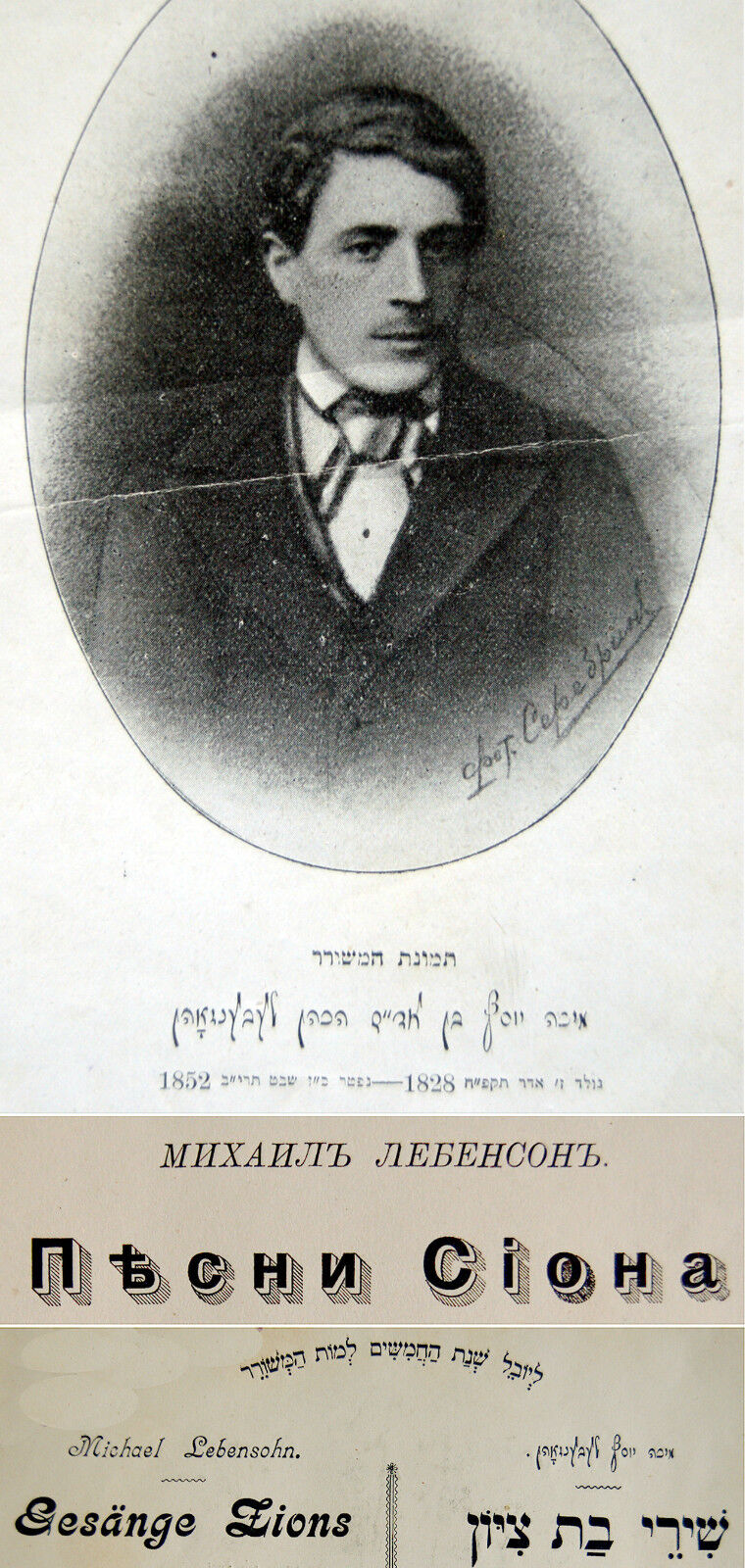
When you click on links to various merchants on this site and make a purchase, this can result in this site earning a commission. Affiliate programs and affiliations include, but are not limited to, the eBay Partner Network.

1902 Russian WILNA Jewish ZIONIST SONG POEM BOOK Judaica GESANGE ZIONS Hebrew:
$95.00
DESCRIPTION : Up for sale is an extremely rare ZIONIST - JEWISH SONG BOOK ( Or POEM BOOK ) which was published in 1902 in WILNA ( Also Wilno, Vilna, Vilno, Vilnius ) in RUSSIA - LITHUANIA ( Also Lita, Lite ) to commemorate 50 years to the death of MICHAEL LEBENSOHN - Also MIKHAL - MIKHA YOSEF LEBENSON , The great Jewish POET. The translation from the original HEBREW - \"SONGS of BAT ZION\" to German \"GESANGE ZIONS\" was made by JOSHUA STEINBERG. Written in HEBREW and GERMAN. Front pages also in RUSSIAN or LITHUANIAN. Original HC with cloth spine. Oblong. 5 x 9\" . 116 PP . Good condition. Used. Cover worn and stained. Inner clean. Tears in spine. ( Pls look at scan foraccurate AS IS images )Will be sent inside a protective rigidpackaging . PAYMENTS : Payment method accepted : Paypal & All credit cards.SHIPPMENT : SHIPP worldwide via registered airmail is $ 29 . Book will be sent inside a protective packaging . Handling around 5-10 days after payment.Lebensohn, Mikhah Yosef Contents Hide Suggested ReadingAuthorTranslation (1828–1852), Hebrew poet and translator. Mikhah Yosef Lebensohn (Mikhal), son of Avraham Dov Lebensohn (Adam ha-Kohen), was born in Vilna. In addition to receiving a traditional Jewish education, he was encouraged by his father to study Russian, Polish, German, and French, and began writing and translating at an early age. In 1845, he was diagnosed with tuberculosis and subsequently traveled to sanatoria in Germany (Reinerz, Salzbrunn, and Berlin) in search of a cure. In Berlin, he was introduced to German culture, including the philosophy of Friedrich Schelling, and befriended the prominent Jewish scholar Shneur Sachs. In 1850, Lebensohn returned to Vilna. Attempts to cure his disease failed and he died at age 24. Lebensohn published two books: Harisut Troyah (1849), a partial translation (from German) of Virgil’s Aeneid; and Shire bat Tsiyon (Songs of a Daughter of Zion; 1851), a collection of poems. After Lebensohn died, his father assembled Kinor bat Tsiyon (Violin of a Daughter of Zion; 1870), poems written during the poet’s last years. Shire bat Tsiyon is devoted to biblical and historic figures, with each piece exploring the motif of humans confronting fundamental issues such as identity, faith and heresy, and life and death. Lebensohn’s lyrical poetry focuses primarily on three subjects: love, prayer, and death. The love he describes is realistic, erotic, and at the same time wistful, unattainable, and utopian. In the poem “Shelomoh ve-Kohelet” (Solomon and Ecclesiastes), Lebensohn presents the two faces of King Solomon: the one, “Solomon,” filled with youth, faith, optimism, love for nature, philanthropy, and love for Shulamit; and the other, “Ecclesiastes,” a man whose wisdom and experience cause him doubts that undermine his faith. Another poem, “Ya‘el ve-Sisra,” presents the murder of Sisera not merely as an act of heroism but also as a moral injustice, showing the betrayal of a defeated adversary who had put his trust in his hostess. Following the advice of Shemu’el David Luzzatto, Lebensohn completed the poem in the spirit of the Bible, but his subversive interpretation of this particular story—as in the case of “Shelomoh ve-Kohelet”—remains. The motif of a hero facing death appears once again in Lebensohn’s “Nikmat Shimshon” (Samson’s Vengeance) and also, most prominently, in two poems devoted to Moses and to Yehudah ha-Levi. Some critics found in Lebensohn’s descriptions of their fates an implied manifestation of the poet’s own fate—a person who, in his own way, observed the “promised land” from afar. The prayer motif is found in “Ha-Tefilah” (The Prayer), “Ha-Boded ba-sadeh” (Alone in the Field), and “El ha-kokhavim” (To the Stars). In these, the poet takes note of nature and the world, observing how they radiate strength and religious, even pantheist inspiration. Though God is present everywhere and in everything, the poet shows that it is not tevel (the world, the universe) that prays, but he, a human being, who experiences phenomena internally and outwardly. The death motif appears in many of Lebensohn’s poems. The best-known example, “Ḥag ha-aviv” (The Holiday of Spring; i.e., Passover), situates the poet in a crowd that includes “beautiful maidens,” all celebrating the holiday in Berlin. The poet does not join the festivities, however, as he is being stalked by re‘ah ayumah (horrible companion/spouse)—his disease—whose ultimate end and purpose is death. Lebensohn’s translations constitute an important element of his total literary output; their structures tend to be loose and often amount to adaptations. In his introduction to Harisut Troyah, he notes that he had chosen to translate sections from the Aeneid because of its beauty and value as a timeless masterpiece; as a zealot of the Hebrew language, he considered it his duty to confront this task. Lebensohn also translated (among other works) parts of Saul by Conte Vittorio Alfieri (Aḥarit Sha’ul) and the ballad “Der Erlkönig” by Goethe (“Melekh balahot”). Many of his own poems were influenced by foreign-language masterpieces. Here and there, his poems contain allusions to Shakespeare’s Hamlet and Macbeth and to Schiller’s “An die Freude” (Ode to Joy)—the famous poem sung in the last movement of Beethoven’s Ninth Symphony. Lebensohn was recognized and appreciated by his contemporaries, and was regarded by scholars as one of the most important writers of his time, a premature genius who followed an unusual path as a poet. He was a maskil poet who did not enlist in the Haskalah wars but regarded himself, first and foremost, as a creative artist. Suggested Reading Joseph Klausner, Yotsrim u-vonim, vol. 1 (Tel Aviv, 1943), 124–142; Joseph Klausner, Historyah shel ha-sifrut ha-‘ivrit ha-ḥadashah, vol. 3, pp. 228–268 (Jerusalem, 1953); Fischel Lachower, Toldot ha-sifrut ha-‘ivrit ha-ḥadashah, vol. 2, pp. 114–133, 305–307 (Tel Aviv, 1963); Micah Joseph Lebensohn, Shire Mikhal: Igrotav ve-targumav (Tel Aviv, 1964); Eisig Silberschlag, From Renaissance to Renaissance, vol. 1, Hebrew Literature from 1492–1970 (New York, 1973); Nahum Slouschz, The Renascence of Hebrew Literature, 1743–1885, trans. Hen-rietta Szold (Philadelphia, 1909). Micah Joseph Lebensohn Micah Joseph Lebensohn (also known as Mikhal) (1828-1852), born in Vilnius, Lithuania, was the son of Abraham Dov Lebensohn, one of the leading Jewish intellectuals of his time and an outstanding poet. Micah Lebensohn received a thorough Hebrew education, including intensive Bible study. He was privately tutored in German, Polish, Russian and French. He began his literary endeavors by translating German poetry. At the age of seventeen, Lebensohn was severely stricken with tuberculosis and was sent to Berlin for medical treatment, where he read and studied as well. He spent the summer of 1850 at the Reinerz Spa, where his condition improved and where he wrote his best work. At the age of nineteen, he translated part of Vergil\'s Aeneid from German, establishing his reputation in the Vilnius literary world. He suffered a relapse the next iwnter, and returned to his father\'s home in Vilnius, where he died. His father published his poems in 1851 and then, posthumously, a collection of his remaining works in 1870. Books Published in Hebrew Shirei Bat Ziyyon, Vilnius, Ram, 1851 Kinnor Bat Ziyyon, Vilnius, Ram, 1870 Adam and Mikhal\'s Collected Poems, Vilnius, Ram, 1895 Poems, New York, Kadimah, 1918 Poems, Translations and Letters, Berlin, Ayyanot, 1924 Poems, Kohelet, 1929 Mikhal\'s Poems, Dvir, 1944 Books in Translation Shirei Bat-Tsion German: Vilnius, (pub. unknown), 1902 Russian Hebrew poet; born in Wilna, Russia, Feb. 22, 1828; died there Feb. 17, 1852. His father, the poet Abraham Bär Lebensohn, implanted in him the love of Hebrew poetry, and Micah Joseph began very early to translate and to compose Hebrew songs. He suffered from consumption during the last five or six years of his short life. In 1849 he was in Berlin, and later went to Salzbrunn and other watering-places, where he vainly sought relief from the terrible disease which had attacked him. About the end of 1850 he abandoned all hope of recovery and returned to Wilna, where he lingered until his death. Lebensohn\'s poetical works are: \"Harisut Troya\" (Wilna, 1849; 2d ed., ib. 1869), a translation of the third and fourth books of Vergil\'s \"Æneid\" after Schiller\' s German translation; \"Shire Bat Ẓiyyon\" (ib. 1851; 2d ed., ib. 1869), epic poems on Jewish subjects, of which his brother-in-law, Joshua Steinberg, published a German translation entitled \"Gesänge Zion\'s\" (ib. 1859); and \"Kinnor Bat Ẓiyyon\" (ib. 1870), a second volume of the foregoing songs, printed posthumously by his father. The most noted elegies on his death are that by his father, entitled \"Mikal Dim\'ah\" (in the second part of \"Shire Sefat Ḳodesh\") and J. L. Gordon\'s allegorical drama, \"Ho Aḥ,\" which is placed in the first part of \"Kol Shire Yehudah.\" Lebensohn\'s poetry surpasses that of his father, and is characterized by a deep pathos and a beauty of expression which are rare in Neo-Hebrew verse. It is also noted for its expression of the young poet\'s strong longing for life and of the dread of an early dissolution which preyed on his mind. Joshua Steinberg (Russian: Осий (Иошуа) Штейнберг; born in Wilna 1839; died 1908)[1] was a Russian Jewish writer and educator. Contents 1 Life2 Works3 References4 Notes5 External links Life He graduated from the Wilna rabbinical school, and then for a short time occupied the position of rabbi at Białystok, being called to Wilna in 1861 to fill a similar position. In 1867 he was appointed head teacher of Hebrew and Aramaic at the rabbinical seminary, and in 1872 was promoted to the position of inspector, which post he held until 1904. His persistent representations led to Russian government in 1863 establishing in Wilna seven elementary city schools for Jewish children. Following the example of Wilna, other schools of the same pattern were established in nearly all cities containing a large Jewish population. In 1863 the Russian government appointed Steinberg censor of all Jewish publications, both domestic and foreign. In 1887 he was requested by the government to inspect the yeshibah at Volozhin with a view to introducing into the curriculum of that institution the study of the Russian language and literature and other general subjects. Steinberg succeeded in convincing the officials of the institution of the necessity of such reforms, and they promised to carry out his plans; two years passed, however, without their complying with the request of the government, and the institution was closed in spite of Steinberg\'s pleadings for another year\'s delay. Steinberg was the recipient of many honors from the Russian government for his devotion and many-sided activities in both literary and educational fields. A hereditary honorary citizenship was bestowed upon him, and he was decorated many times. Works Steinberg\'s literary productions are many and varied. The following is a list of his more important works: Russian: \"The Organic Life of the Language\" (1871), published in the \"Viestnik Yevropy\"; \"Grammar of the Hebrew Language\" (Wilna, 1871); \"Book of Exercises in the Chaldean Language\" (1875); \"Complete Russian-Hebrew Dictionary\" (1880); \"Hebrew and Chaldean Dictionary of the Bible,\" awarded a prize by the Holy Synod; \"The Jewish Question in Russia\" (1882); \"Complete Russian-Hebrew-German Dictionary\" (1888), seventeen editions; \"The World and Life,\" two editions; \"Count Muraviev and His Relations to the Jews of the Northwestern Parts of Russia\" (1889); \"The Five Books of Moses,\" with commentary. Hebrew: \"Human Anatomy, According to the Most Modern Investigations\" (1860); \"Or la-Yesharim\" (Wilna, 1865), an anthology from the ancient and the modern classics, written in the poetic style of the Bible, and annotated with moral reflections and observations; \"Massa Ge Ḥizzayon\" (1886), metric translations from the Greek Sibyls; \"A Hebrew-Russian-German Encyclopedic Dictionary of the Bible\" (1896); \"Darwin\'s Theory in Its Relation to the Organic Life of Languages\" (1897); \"Ma\'arke Leshon \'Eber,\" a Hebrew grammar. German: \"Knospen,\" a translation of Hebrew poems by A. B. Lebensohn; \"Gesänge Zions,\" a translation of Hebrew poems by Michael Lebensohn. References William Zeitlin, Bibl. Post-Mendels. 1616

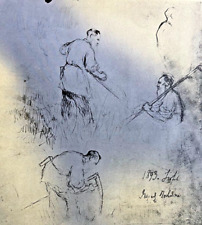
1902 Russian Author Count Leo Tolstoy illustrated $27.99
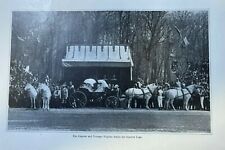
1902 Russian Army Military Parades and Parade Training illustrated $27.99
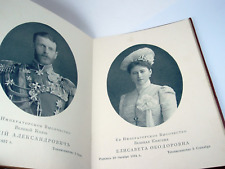
1902 IMPERIAL ALBUM ROMANOV DYNASTY RUSSIAN GRAND DUKES DUCHESS 39 MODERN PHOTOS $24.95
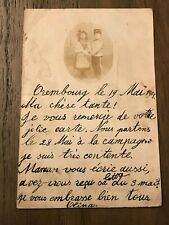
Russian postcard children 1902 $20.00
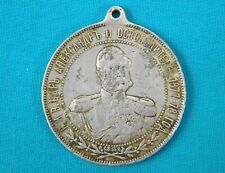
Antique 1902 Imperial Russian Bulgarian Alexander II Commemorative Jeton Badge $80.00
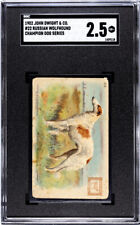
1902 John Dwight & Co. Russian Wolfhound #22 Champion Dog Series SGC 2.5 $49.99
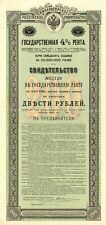
Gouvernement Imperial de Russie, 4% - 1902 Russian Bond (Uncanceled) - Foreign B $208.00
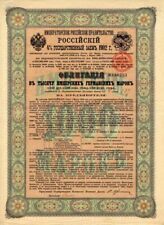
Russian Bond 1902 - Foreign Bonds $149.00
|